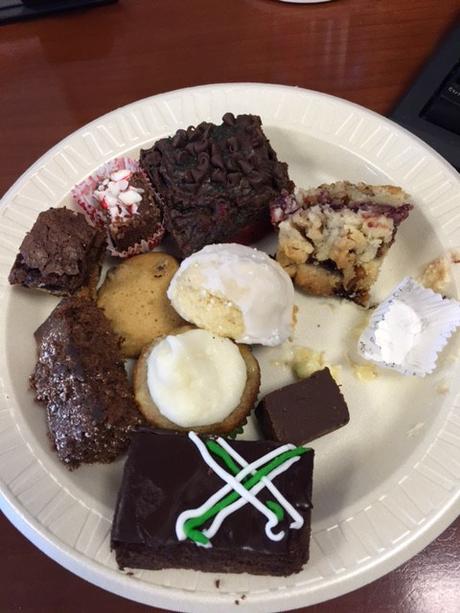Last week there was a holiday fair at the office. Several coworkers - many who work in other departments and fall into the "name rings a bell" category - sold goods like knitwear or jewelry that they made by hand. It was actually pretty remarkable to glimpse the unseen passions and hidden talents of the many near-strangers I see only in passing during elevator rides or pilgrimages to the corners of the office where a birthday cake is rumored to be found. It was refreshing to remember that everyone's lives are much richer than the eight hours we spend conjoined in cubicles each day. That our perception of the people we work with is a snapshot of who they are with a business casual filter applied. The fair itself was lovely, but the baking contest was a sad reminder of how tense eating can be, especially as a woman.
When emails about the holiday fair were sent out a few months back the cynic in me expected low participation, but the spread for the bake off alone proved me wrong. There was a huge assortment of desserts anonymously labeled and arranged atop a long stretch of file cabinets just outside the CEO's office. Each sweet was deliciously flawed the way all home-baked goods made with love are, unintentionally garnished with fallen crumbs and smudged frosting.
There were several women with empty plates circling the sweets by the time I made my way over. With nothing resting on them, the plates were little more than accessories that indicated eating might happen soon if someone was brave enough to make the first move. Until that time the plates were held vertically with meticulous manicures tapping the bottom. One was used idly as a fan. The scene would look like vultures zeroing in on carrion if vultures watched the Victoria's Secret Fashion show, used a calorie counting app, followed several squat pages on Instagram, and were hyperaware that eating in public carries the risk of unwanted assumptions.
There were men there, too, but who can recall how much they were eating? Was it a whole steer? An entire chocolate cake? What ends up on a man's plate is rarely scrutinized the way a woman's plate is. Plate policing is a woman's sport, for how often does a man say to another man, "Bro, I think you need to ease up on those wings. There's a surprising amount of fat in these - I looked up the nutritional values before we went out"? Or does it seem much more likely that a man would be teased for eating a salad in lieu of steak and potatoes because dietary limitations are effeminate? Men may not be exempt from healthy eating or the effects of a routine calorie surplus, but eating isn't the carefully orchestrated effort for men the way it can be for women.
"There's no way I could ever eat all this," one woman remarked. There was the slightest edge of defense in her voice, as if she were clearing the air.
"I should not be near all this chocolate," someone else murmured, eyeing the fudge.
I had already started filling my plate with a piece of everything that looked appetizing: a chocolate chip cookie, a Hummingbird cupcake (that I assumed contained no actual hummingbird), and several types of brownies, among other things. My plate wasn't the portrait of a balanced meal, but it wasn't supposed to be. This was a special occasion, because how often do you get to sample a variety of homemade desserts and judge the baking skills of your coworkers at the same time?

I felt no qualms about eating a bit of everything because in my longstanding "It's Complicated" relationship with food, I've grown comfortable with the balance between moderation and celebration. I know when I'm eating for the wrong reasons and when too much is really too much. I know that no body is ever ruined by an extra brownie and that a person can always get back on track after a period of poor eating. These aren't easy things to learn and it's especially hard to keep these truths in mind when someone's side-eyeing your plate, claiming you won't be able to finish something, or making judgments about your personal health based on one shared eating experience, but unfortunately these are often the conditions in which women break bread.
It might be proper etiquette to blanch when faced with so many desserts, but I've held onto the chutzpah of the fat girl I was for many years who knows when people are watching and whispering, "She doesn't need all that," or "Now we know why she's so big," but still eating exactly what I damn well please anyway. Yet, as I moved from tray to tray that afternoon, I still fought the nagging feeling that I should say something to join in the collective dessert doubt. Commiserating over cookies is practically a bonding ritual for women. An "I'm gonna regret this later," or "I'll be on the Stairmaster all day tomorrow," would be perfect. It would reassure everyone that I'm not one of those people that - gasp - eats a lot of desserts. It would excuse my heaping plate. It would prove that I'm cognizant of my choices and that I'm mentally competent to add a piece of peppermint fudge to my pile.
Not every woman does it, and it doesn't happen everywhere that food is present, but I think we've all felt pressure to justify our plates at least once at a family gathering, at a sample stand at the grocery store, or at an office retirement party. We've all beamed with the pride of self-restraint upon announcing that we weren't going to eat something, as if in doing so we'd pleased the appetite suppression gods while simultaneously proving to everyone around us that we're dainty and health-conscious, unlike those slobs who might happily eat huge portions of junk without a thought for calories or carbs. It's like a play we put on to normalize our weird eating hang-ups and the subtle fat shaming we're grown accustomed to.
Appetitus AndronicusScene 1: Feign shock at how much food there is! Comment that you won't be able to eat all of this even though you're not sure why you feel compelled to make that clarification.
Scene 2: Make a remark about how naughty you're being even eating any of this stuff. Offer to split something in half with someone because having an eating accomplice makes you feel better.
Scene 3: Limit yourself to eating less than you want because you've reached the socially acceptable amount of plate fullness.
Scene 4: Leave several bites behind because clearing your plate would mean you ate everything, and you don't want to eat everything.
Scene 5: Tell anyone who will listen that you just couldn't eat all that, and if you had, you'd have to spend the rest of the week on the treadmill ha ha!
There's nothing wrong with admitting defeat and throwing in your napkin. There will be events with delicious food that you'll pass on for any number of reasons: you're wearing Spanx, you had fried chicken the day before, or you're training for a 5k. We certainly don't need to justify why we refuse food, but most often that's not even what we're doing anyway. We're not refusing; we're performing. We're saying the things that we think that we're supposed to say to prove we haven't gone off the dessert deep end, and it's tantamount to subtle fat shaming. When we announce that we can't eat something or that we'll have to make up for eating something at the gym, what are we really saying? We're suggesting that there's superiority in limitation. We're trying to distance ourselves from the stray assumption that we could actually just eat a bunch of food and go on with our lives without excusing it or exercising it away, even if we become a bit plumper as a result.
When I was heading back to my desk to begin my judging for the bake off (i.e. tearing up those goodies) I passed someone who glanced at my plate and said, "You can't eat all that." Interestingly enough, that very evening when I was talking to my boyfriend about the fair, I showed him the picture of my plate, and before I could even tell him I planned on writing about eating he said, "You couldn't eat all that."
This isn't the first time people have reacted with disbelief to things that I've consumed or planned to consume. It happens fairly often: waiters surprised that I cleared my plate and still want dessert or friends wondering how I still have room for more. With that said, I'm going to let you in on something very important-something Rafiki would tell you if this was The Lion King: Reacting to how much someone eats usually makes them uncomfortable and brings up a lot of weird feelings, especially if they've struggled with food in any way-which most of us have. More importantly though, it is almost never any of your damn business to comment on what anyone is eating in the first place.
Why would anyone assume that I couldn't eat a plate full of desserts, or anything for that matter? Is it because I'm not fat anymore and therefore can only eat like a bird? Is it because it violates the food pyramid? Is it because I exercise daily and therefore don't partake in that kind of naughty eating behavior? Why is anyone thinking that much about what will fit in my own stomach in the first place? Why does anyone other than me have preconceived notions about what I can consume?
And that's how this all gets even more complicated, because we don't just act coquettishly around food for each other's benefit-we do that in conjuncture with saying things like "You can't eat all or that," or "You ate that whole thing?" so that it's nearly impossible to ever feel completely okay about anything that you're eating. When people plate hate they're implying that you're doing something wrong. When you respond with a justification - like how many how many miles you'll run to make up for it - you're accepting their food shaming and inviting further commentary from them the next time you take the last breadstick or go back for a second piece of pie. That problematic relationship supports the culture that says someone or something other than you is better able to determine what you should do with your body, what constitutes health, and what represents beauty.
Sometimes people mean well. Sometimes they're keeping the promise they made to help you save you from yourself when it comes to guacamole. Only you know when food feedback is welcome, but we live in a society that's obsessed with the pursuit of Health: that problematic state of nirvana that means eating only organic food to one person and seeing a certain number on the scale to another. We've embraced the notion that it's perfectly acceptable for other people to define our relationship with food, and that is not okay. Generally speaking, if you are an adult of appetite-spoiling age, you are the person most qualified to make decisions about what you eat. That means you should probably eat some vegetables once in a while and avoid subsisting solely on doughnuts, Mountain Dew, and licorice. It also means you'll have days when you nourish your body with things that make you feel great from the inside out and others when you eat delicious things that make you feel like Grimace later on.
Eating is about balance, accountability, and understanding. Filling your plate with brownies isn't something you should make habit, and if you routinely binge and feel bad about it afterwards, you might need to examine your eating habits more closely, but getting too hung up on the pasta or second piece of cake you eat is a socially acceptable form of disordered eating. If you ask me, true healthy eating isn't always about green juice and super foods-healthy eating is accepting that you have a responsibility to take care of your body by feeding it good foods, but sometimes that includes way too many cookies. There's a peace in knowing that one day of caloric intake sabotage isn't going to ruin you or - gasp - make you fat.
Our relationship with food gets intense around the holiday season when commercials for weight loss plans start airing before you've even finished baking the last batch of cookies, so it's more important than ever to do what you can to make eating less complicated. Don't let someone's raised eyebrows keep you from getting seconds. Avoid justifying why you're eating what you're eating, especially if you only feel compelled to do so to fit in with other people doing the same. If someone doesn't want to split something with you, don't bully or guilt them into eating because that's incredibly uncool. Remember that fat shaming someone inspires resentment, not gratitude. Be mindful of what you eat, but don't measure each portion of food by how long you'll be on the elliptical removing it from your permanent calorie record.
And for the ladies especially, let's stop the plate police brutality. It can be tough enough being a woman in this world without worrying how we might look when we're eating at a potluck.

Katie Hoffman is a writer living in the suburbs of Chicago. You can follow her on Twitter and Instagram @bykatiehoffman.

